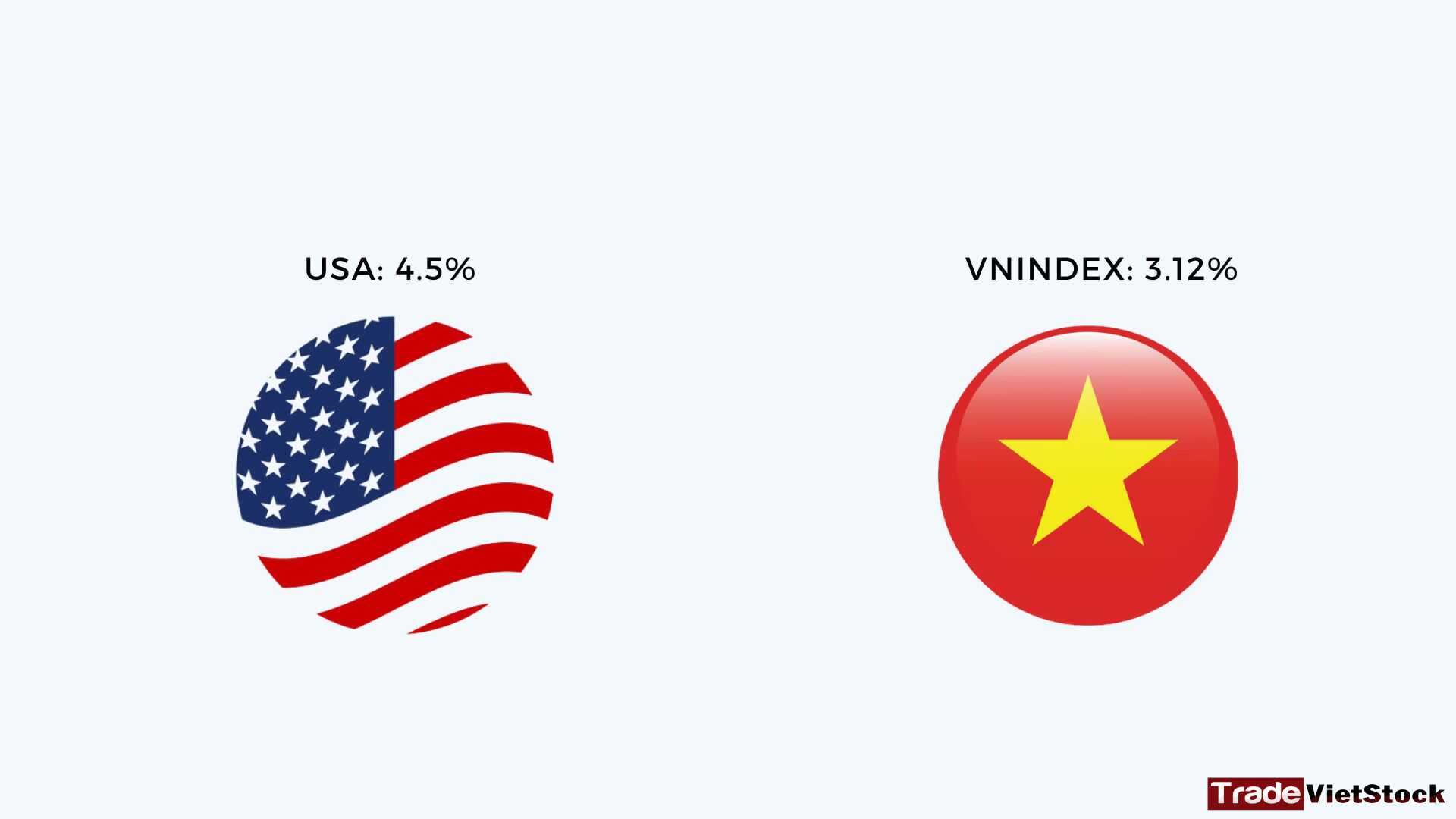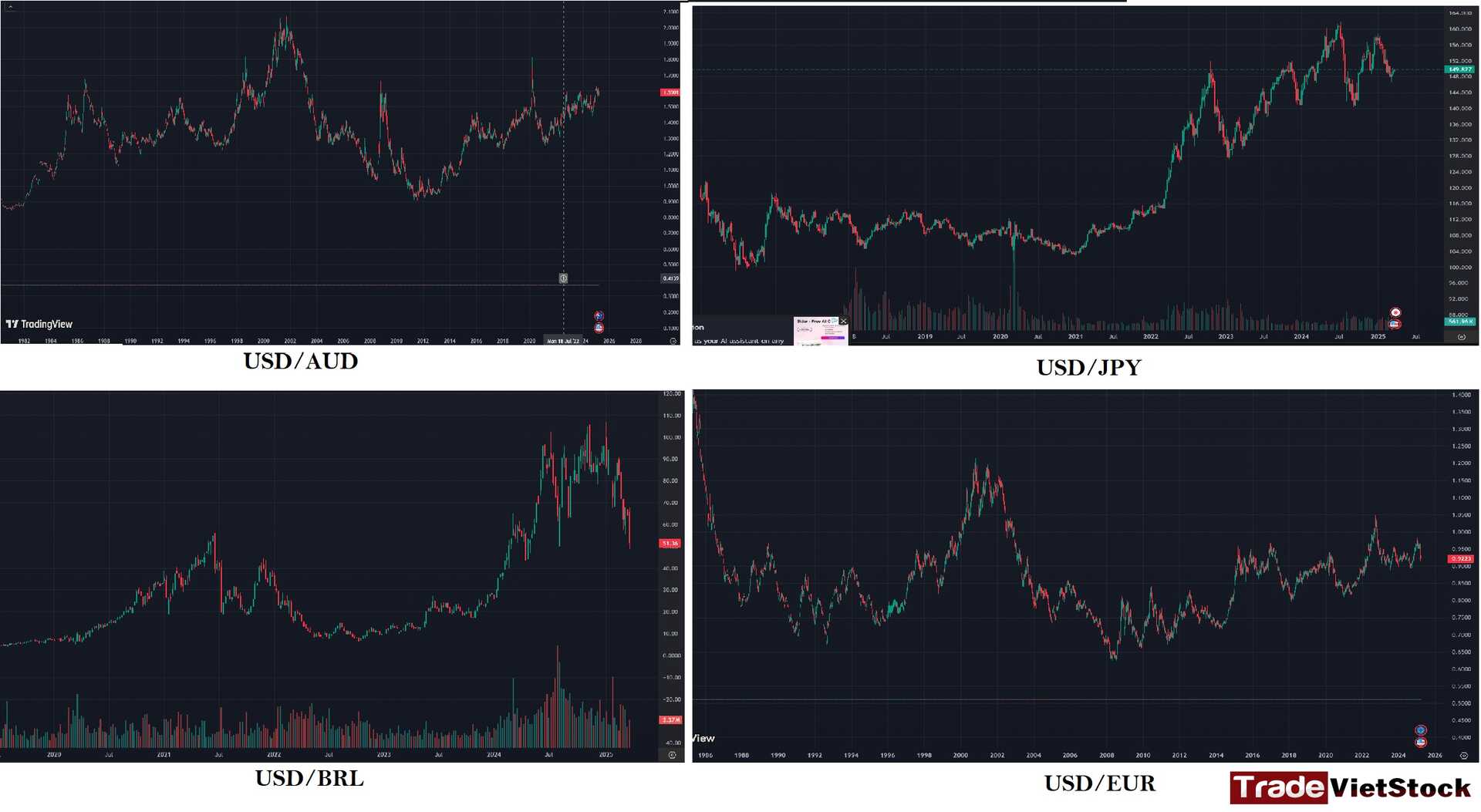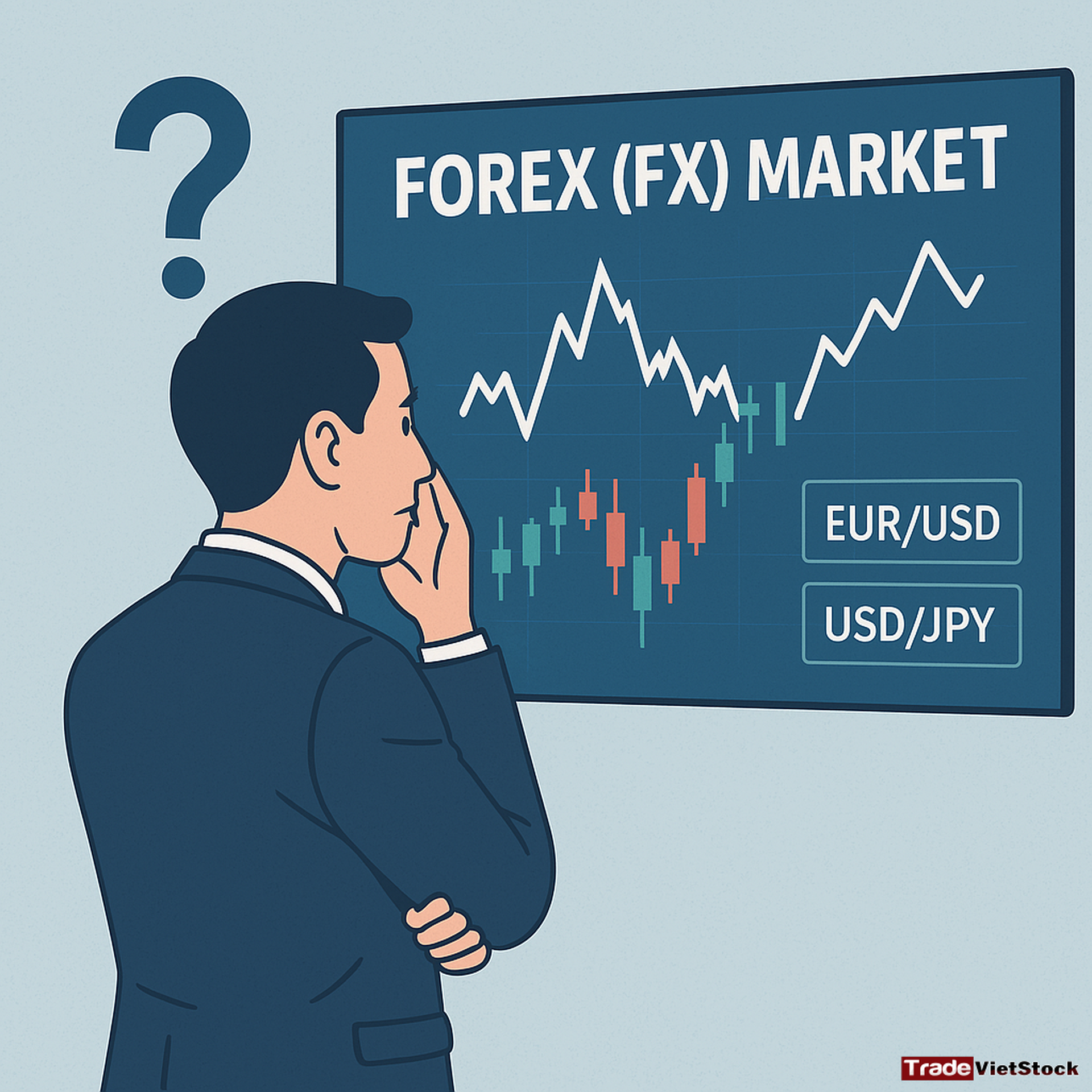Basics about the Forex Market
| Date: 04/04/2025 | 533 Views | Investment and Trading Academy |
Basics about the Forex Market you should know before trading
Hello, fellow investors! I’m Tradevietstock, proud to be a leading investment advisory firm, always ready to support you—from building a strong knowledge foundation to applying investment strategies effectively. We offer exclusive indicators that you can only find on Tradevietstock.

Today, we’ll dive into one of the fundamental topics in trading: Basics about Forex Market. It really easy bro! Whether you’re new to Forex or looking to refine your understanding, we hope this article provides valuable insights to help you on your investment journey.
Have You Ever Wondered How Forex Works?
The exchange rate between USD and AUD fluctuates daily. While some changes may seem small, there are times when the market moves significantly. But why does this happen?
For example:
- The USD/JPY pair surged by approximately 44% from 2021 to 2025.
- USD/EUR appears more stable compared to other currency pairs—why is that?
In this blog, we’ll dive into the fascinating world of Forex, exploring how currency values shift and what drives these changes. Let’s get started!
i. Basics About Forex Market
So, what exactly is the Forex market? Before diving deep, let’s start from the basics! At its core, Forex revolves around one fundamental concept: the exchange rate. Understanding exchange rates is key to grasping how the market operates.

1. Base Currency & Quote Currency
An exchange rate consists of two components:
- The base currency (the first currency in the pair).
- The quote currency (the second currency in the pair).
For example:
- GBP/USD = 1.30 → 1 British Pound (GBP) equals 1.30 US Dollars (USD).
- USD/JPY = 150 → 1 US Dollar (USD) equals 150 Japanese Yen (JPY).
2. Exchange Rate Theories
Several economic principles explain how exchange rates move, but two of the most important are:
- Purchasing Power Parity (PPP): This theory suggests that exchange rates adjust so that the same basket of goods costs the same across different countries. If one country has higher inflation, its currency tends to depreciate to restore balance.
- Interest Rate Parity (IRP): According to this theory, differences in interest rates between two countries influence exchange rates. A country with higher interest rates attracts more investors, leading to currency appreciation (assuming no capital controls or external risks).
3. How It Works in Reality
In practice, exchange rates are shaped by both of these theories, but market forces add another layer of complexity. Money flows from countries with lower interest rates to those offering higher returns. At the same time, traders and businesses sell overvalued currencies (those tied to expensive goods and services) and buy currencies linked to cheaper products. This constant buying and selling influence exchange rates, making them fluctuate over time.
The basics about Forex market is that it is a global marketplace where currencies are actively traded. It involves banks, financial institutions, corporations, and individual traders who buy and sell currencies. Operating 24/5, it is the largest financial market in the world.
Although different strategies are used to manage exchange rates, the ultimate goal remains the same—maintaining stability. A stable exchange rate is crucial for facilitating smooth international trade and economic growth.
ii. How Does the Forex Market Work?
Before jumping into the market, I believe it’s essential to understand its structure, the key participants, and most importantly—how traders make money from it. After all, to truly grasp the basics about Forex market, we need to break down its core elements.
1. Market Structure & Key Participants

The basics about Forex market is that it operates as a decentralized global marketplace, involving various players:
- Central Banks & Governments: Influence currency value through monetary policies, interest rate decisions, and interventions.
- Commercial Banks: Conduct large-scale currency transactions for clients and their own investments.
- Institutional Investors & Corporations: Trade currencies to hedge risk or facilitate international business operations.
- Retail Traders: Individual investors who speculate on price movements using online trading platforms.
2. Types of Forex Markets
Understanding the different market structures is key to knowing the basics about Forex market and how traders operate within it:
- Spot Market: Immediate exchange of currencies at the current market price.
- Futures & Options Market: Contracts to buy or sell a currency at a predetermined price and date.
- Forward Market: Private agreements to exchange currency in the future with customizable terms.
3. Where Do Traders Make Money?
While the basics about Forex market serves various purposes, most investors focus on the futures market. Unlike businesses engaged in import-export, traders are not concerned with physical currency exchange. Instead, they seek profits by taking long (buy) or short (sell) positions, leveraging price fluctuations to generate returns.
iii. How to Invest in the Forex Market
Investing in the Forex market can be highly rewarding, but success requires knowledge, strategy, and risk management. Here are the essential steps to get started.
1. Choose a Reliable Broker
The first step in learning how to invest in the basics about Forex market is selecting a regulated broker. A reliable broker should offer:
- Competitive spreads and low fees.
- Strong security measures and fast transactions.
- Access to professional trading platforms like Bitget, Exness.
2. Understand Leverage and Margin
Forex trading offers high leverage, allowing traders to control large positions with small capital. While leverage can increase profits, it also amplifies risk. Understanding how margin works is crucial to managing exposure effectively.
3. Learn Fundamental and Technical Analysis
Successful Forex traders use two main types of analysis:
- Fundamental Analysis (FA): Focuses on economic indicators, interest rates, central bank policies, and political events that influence currency values. This approach is effective for long-term trends.
- Technical Analysis (TA): Uses price charts, indicators like RSI, MACD, and Moving Averages, and historical patterns to predict short-term price movements.
TradeVietstock provides specialized indicators tailored for Forex trading. Contact us for more details.
4. Practice with a Demo Account
Before investing real money, practicing on a demo account is crucial to developing strategies and gaining market experience. Many traders use platforms like Exness to simulate real trading conditions and test strategies without financial risk. (click here to open an Exness account, Mexc, Biance,…)
5. Develop a Trading Strategy
A well-defined trading strategy is essential for those learning how to invest in the basics about Forex market. Traders should consider:
- Market-moving events such as economic reports and elections.
- Their personal risk tolerance and preferred trading style (scalping, day trading, swing trading).
- Identifying key entry and exit points based on analysis.
- You can refer to more information at Tradevietstock’s trader community here.
iv. Conclusion
The basics about Forex market presents countless opportunities for traders and investors, but it also comes with significant risks. Understanding how the market operates, applying the right strategies, and managing risks effectively are the keys to success.
At Tradevietstock, we are committed to guiding you on your Forex trading journey by providing in-depth knowledge, market analysis, and powerful trading tools. Follow us to stay updated with the latest trading strategies and maximize your profits!
Wishing everyone successful trades!

We have our fan page on Facebook for Cryptocurrency and Forex CFDs trading signals and analysis for every week, you can check this out: [HERE]
Furthermore, if you want real-time signals everyday, you can check out our small Investment and Trading community on Telegram: [HERE]
If you value our investment analysisn and this “What is the best price to buy Bitcoin” article, you can register trading accounts from the top-tier crypto exchanges below. Wishing everyone successful trades!
📌 Interested in learning more about different account types or crypto trading knowledge? Check out our educational resources HERE
📌 Want to see detailed reviews of the top 5 best crypto exchanges? Read the full review HERE
Register for the Top 5 Best Crypto Exchanges Now
[Link to register for a free Binance account]
The largest exchange currently
[Link to register for a free Bitget account]
Exchange with many financial products
Link to register for a free Mexc account]
Exchange with the lowest costs in the world
Link to register for a free Bybit account]
Exchange with professional financial technology
[Link to register for a free OKX account]
Exchange connected with DEX


 Tiếng Việt
Tiếng Việt


